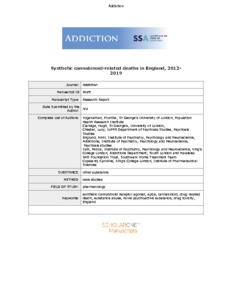Yoganathan, P; Claridge, H; Chester, L; Englund, A; Kalk, NJ; Copeland, CS
(2022)
Synthetic Cannabinoid-Related Deaths in England, 2012-2019.
Cannabis Cannabinoid Res, 7 (4).
pp. 516-525.
ISSN 2378-8763
https://doi.org/10.1089/can.2020.0161
SGUL Authors: Claridge, Hugh Robert
![[img]](https://openaccess.sgul.ac.uk/114607/1.hassmallThumbnailVersion/SynthCannabProofofsubmittedmanuscript200918.pdf)  Preview |
|
PDF
Accepted Version
Available under License ["licenses_description_publisher" not defined].
Download (270kB)
| Preview
|
Abstract
Aim: To identify drug-related death trends associated with synthetic cannabinoid receptor agonists (SCRAs) reported to the National Programme on Substance Abuse Deaths (NPSAD) from England. Design: Case reports from NPSAD (England) where a SCRA was detected in post-mortem tissue(s) and/or implicated in the death were extracted, analyzed, and compared against non-SCRA-related deaths that occurred over the same time period (2012-2019). Findings: One hundred sixty-five death SCRA-related reports were extracted, with 18 different SCRAs detected. Following the first death in 2012, a subsequent sharp increase in reporting is evident. Acute SCRA use was the underlying cause of death in the majority of cases (75.8%) with cardiorespiratory complications the most frequently cited underlying physiological cause (13.4%). SCRA users were predominantly found dead (68.6%), with a large proportion of those witnessed becoming unresponsive described as suddenly collapsing (81.6%). Psychoactive polydrug use was detected in 90.3% of cases, with alcohol the most commonly co-detected (50.3%), followed by opioids (42.2%), benzodiazepines/Z-drugs (32.1%), stimulants (32.1%, [28.5% cocaine]), and cannabis (24.8%). Compared to all non-SCRA-related NPSAD deaths occurring over the same time period, SCRA-related decedents were more predominantly male (90.3% vs. 72.0%; p<0.01), and lived in more deprived areas (p<0.01). While a comparatively significant proportion of decedents were homeless (19.4% vs. 4.1%), living in a hostel (13.3% vs. 2.3%) or in prison (4.9% vs. 0.2%) at time of death (all p<0.01), the greatest majority of SCRA-related decedents were living in private residential accommodations (57.6%). Conclusions: This is the largest dataset regarding SCRA-related mortalities reported to date. Reporting of SCRA-related deaths in England have increased considerably, with polydrug use a specific concern. Lack of effective deterrents to SCRA use under current UK legislation, compounded by limited knowledge regarding the physiological impacts of SCRA consumption and their interaction with other co-administered substances are contributory factors to the occurrence of SCRA-related mortalities in an increasingly deprived demographic.
| Item Type: |
Article
|
| Additional Information: |
This is the accepted version of the following article: Pruntha Yoganathan, Hugh Claridge, Lucy Chester, Amir Englund, Nicola J. Kalk, and Caroline S. Copeland.Synthetic Cannabinoid-Related Deaths in England, 2012–2019.Cannabis and Cannabinoid Research.Aug 2022.516-525., which has now been formally published in final form at Cannabis and Cannabinoid Research at https://doi.org/10.1089/can.2020.0161. This accepted version of the article may be used for non-commercial purposes in accordance with the Mary Ann Liebert, Inc., publishers’ self-archiving terms and conditions. |
| Keywords: |
cannabinoid, drug-related death, novel psychoactive substance, spice, substance abuse, synthetic cannabinoid receptor agonist, synthetic cannabinoid receptor agonist, spice, cannabinoid, drug-related death, substance abuse, novel psychoactive substance |
| SGUL Research Institute / Research Centre: |
Academic Structure > Population Health Research Institute (INPH) |
| Journal or Publication Title: |
Cannabis Cannabinoid Res |
| ISSN: |
2378-8763 |
| Language: |
eng |
| Publisher License: |
Publisher's own licence |
| PubMed ID: |
33998886 |
| Web of Science ID: |
WOS:000624136200001 |
| Dates: |
| Date |
Event |
| 2022-08-09 |
Published |
| 2021-02-24 |
Published Online |
|
 |
Go to PubMed abstract |
| URI: |
https://openaccess.sgul.ac.uk/id/eprint/114607 |
| Publisher's version: |
https://doi.org/10.1089/can.2020.0161 |
Statistics
Item downloaded times since 13 Jan 2023.
Actions (login required)
 |
Edit Item |



